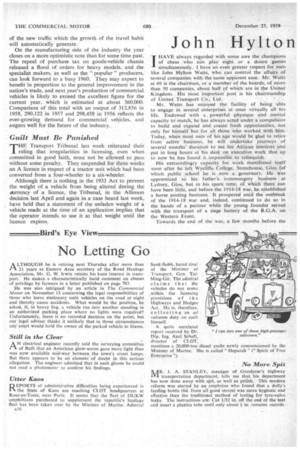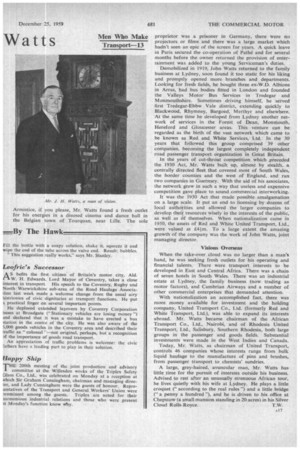John Hylton
Page 18

Page 19

If you've noticed an error in this article please click here to report it so we can fix it.
Watts
IHAVE always regarded with some awe the champions of chess who en play eight or a dozen games simultaneously. I have an even greater respect for men like John Hylton Watts, who can control the affairs of several companies with the same apparent ease. Mr. Watts at 69 is the chairman, or a member of the boards, of more than 50 companies, about half of which are in the United Kingdom. His most important' post is his chairmanship of United Transport. Co., Ltd.
Mr. Watts has enjoyed the facility of being able to engage in several enterprises at once virtually all his life. Endowed with a. powerful physique and mental capacity to match, he has always acted under a compulsion to build and expand and create fresh opportunities, not only for himself but for all those who worked with him. Today, when most men of his age would be glad to retire from active business, he will undertake journeys of several months' duration to see his African interests arid put in tong hours' at his desk on executive work that, up to now he has found it impossible to relinquish.
His extraordiqty capacity for work manifested itself soon after he left Wycliffe College, Stonehouse, .Glos (of which public -school he is now a governor). He was apprenticed .to‘ his father's ironmongery business at Lydney, Glos, but in his spare time, of which there can have been little, and before the 191448 war, he established a horse posting business. It prospered until the outbreak of the 1914-18 war and, indeed, continued to do so in the hands of a partner while the young founder served with the transport of a siege battery of the R.G.A. on the Western Front.
Towards the end of the war, a few months before the Armistice, if you please, Mr. Watts found a fresh outlet for his energies in a disused cinema and dance hall in the Belgian town of Tourquan, near Lille. The sole proprietor was a prisoner in Germany, there were no projectors or films and there was a large market which hadn't seen an epic of the screen for years. A quick leave in Paris secured the co-operation of Pattie and for several months before the owner returned the provision of entertainment was added to the young Serviceman's duties.
Demobilized in 1919, John Watts returned to the family business at Lydney, soon found it too static for his liking and promptly opened more branches and departments. Looking for fresh fields, he bought three ex-W.D. Albions in Arras, had bus bodies fitted in London and founded the Valleys Motor Bus Services in Tredegar and Monmouthshire. Sometimes driving himself, he served first Tredegar-Ebbw Vale district, extending quickly to Blackwood, Rhymney, Bargoed, Merthyr and elsewhere. At the same time he developed from Lydney another network of services in the Forest of Dean, Monmouth, Hereford and Gloucester areas. This venture can be regarded as the birth of the vast network which came to be known as Red and White Services, Ltd. In the 30 years that followed this group comprised 39 other companies, becoming the largest completely independent road passenger transport organization in Great Britain.
In the years of cut-throat competition which preceded the 1930 Act, Mr. Watts built up, almost by stealth, a centrally directed fleet that covered most of South Wales, the border counties and the west of England, and ran two companies in Guernsey. With the aid of his associates, the network grew in such a way that useless and expensive competition gave place to sound commercial interworking.
It was the 1930 Act that made possible amalgamation on a large scale. It put an end to licensing by dozens of local authorities and allowed the larger companies to develop their resources wisely in the interests of the public, as well as Of themselves. When nationalization came in 1950, the assets of Red and White United Transport, Ltd., were valued at £411m. To a large extent the amazing growth of the company was the work of John Watts, joint managing director.
Visions Overseas
When the take-over cloud was no larger than a man's hand, he was seeking fresh outlets for his operating and financial talents. There were transport interests to be developed in East and Central Africa. There was a chain of seven hotels in South Wales. There was an industrial estate at Lydney, the family business (now trading as motor factors), and Cambrian Airways and a number of other commercial enterprises that demanded attention.
With nationalization an accomplished fact, there was more money available for investment and the holding company, United Transport Co., Ltd. (formerly Red and White Transport, Ltd.), was able to expand its interests abroad. Mr. Watts became chairman of the African Transport Co., Ltd., Nairobi, and of Rhodesia United Transport, Ltd., Salisbury, Southern Rhodesia, both large groups in the passenger and goods fields. Substantial investments were made in the West Indies and Canada.
Today, Mr. Watts, as chairman of United Transport, controls 46 companies whose interests range from bulk liquid haulage to the manufacture of pins and brushes, from passenger transport to chemists' sundries.
A large, grey-haired, avuncular man, Mr. Watts has little time for the pursuit of interests outside his business. Advised to rest after an unusually strenuous African tour, he lives quietly with his wife at Lydney. He plays a little croquet (" according to the real rules") and a little bridge (" a penny a hundred "), and he is driven to his office at Chepstow (a small mansion standing in 20 acres) in his Silver Cloud R ol Is-Royce. T.W.
















































































